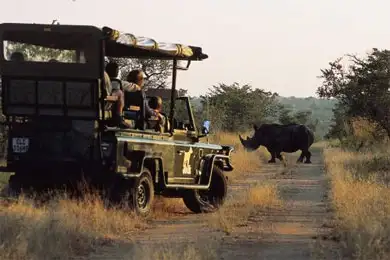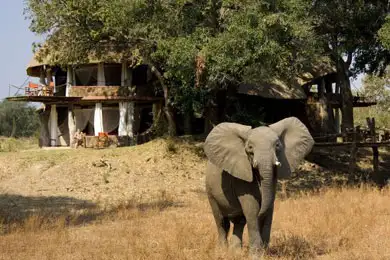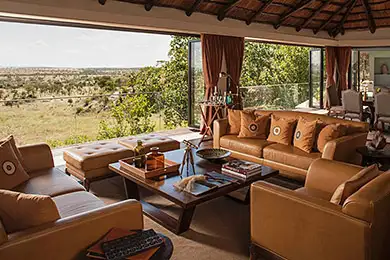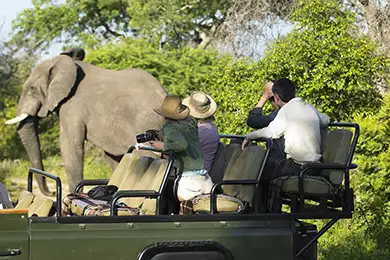
Few things in life create stronger bonds between parents and their children than shared adventures, and the African bush sets the stage for experiences you just can’t get anywhere else in the world. Think about it: A trip to Africa will introduce your kids to the cradle of civilization, get them up close to animals they’ve previously only seen on TV or at the zoo, and, perhaps most importantly, show your entire family the challenges of Second and Third world countries. A trip to Africa broadens horizons in so many ways and–and according to travel agents across the country–more and more families are determined to make the trek.
What Exactly is a Safari?
Generally speaking, most family safaris take place within national parks or private game reserves in countries like South Africa, Botswana, Kenya, Tanzania, Zambia and Namibia. You can select luxury lodges with thatch-roofed, multi-room standalone bungalows, tented accommodations, or even mobile camps.
The entire point of a safari is to get in close proximity to the “Big Five,” which include the elephant, lion, leopard, Cape buffalo and black rhinoceros. While those may be the most popular animals, safari drives also encounter — depending on geographic location and time of year — cheetah, hyena, hippo, giraffe, dozens of deer-like animals (steenbok, duiker, springbok, bushbuck, impala, nyala, etc.), wildebeest, warthog and bushpig, vervet monkey, baboon, mongoose, wild dog and hundreds of species of birds.
The day generally starts very early with a knock on your door between 5 and 6 a.m., though some camps offer babysitting during the morning drive in case your young ones aren’t early risers and other camps have special “family” drives after breakfast to eliminate the early wake-up call. Before the game drive, your family will grab some quick sustenance (coffee, milk, juice and pastries) and then join a ranger and tracker in a safari vehicle — sometimes in the style of an open-air Land Rover or a soft-top Jeep.
The tracker, who sits on a special seat attached to the vehicle’s front bumper, watches for animal tracks and scat and signals which way to go to the ranger driving. Rangers talk about the bush and animals during the drive and get you as close as possible to the animals — while considering your safety and that of the animals at the sighting.
You’ll spend a few hours roaming during your morning game drive and will return to the lodge for a massive breakfast. During the day, you can often visit a local village or school (plenty of philanthropic opportunities exist); go swimming in the lodge’s pool (or cool off in your bungalow’s private plunge pool); go on a walking safari around the camp with a ranger; get a spa treatment; watch the animals at the camp’s watering hole; read a book; play games; or simply catch up on your rest.
Lunch and a very civilized afternoon tea are generally served and then an afternoon/evening game drive takes place. Once again, you’ll spend a few hours driving the camp’s territory in search of animal sightings. Toward the end of the drive, your ranger will stop the vehicle and prepare drinks and snacks for you and your children to enjoy as the brilliant orange sunsets with the savannah as its backdrop. It’s something you’ll never forget.
Are Safaris Safe?

Safety is of utmost concern to parents everywhere so, of course, you’ll wonder about safari vacations. The biggest threat you can encounter is the mosquito-born disease of Malaria. You can opt to travel to one of several Malarai-free zones like the Madikwe Game Reserve or the Shamwari Game Reserve (both in South Africa), or you can take preventative medication.
Protect yourself and your family by consulting with both your pediatrician, as well as a travel doctor before your trip. Malaria is prevalent in many parts of Africa and you’ll need to take preventative prescription medication (or, choose a safari in a Malaria-free region).
Another aspect of safety concerns the stability of the country itself. Before embarking on a vacation anywhere, you should check the U.S. State Department’s Bureau of Consular Affairs country-by-country database. Warnings and alerts are posted concerning the safety of a country in terms of your risk for violence and for outbreaks of diseases like H1N1 flu.
Your safari specialist or travel agent can also explain safety factors for the areas in which you’ll be traveling.
As fantastic as an African safari vacation can be, it may not be right for all families. Here are 10 tips to make your adventure a successful one:
1. Do Your Research
Like any complicated trip, research, research and do some more research! You’ll want to select the country in Africa that matches your requirements (Malaria-free area; presence of certain animals; ease of travel; existence of clean, comfortable and affordable family accommodations; etc.).
Once you decide on a country (or countries), you’ll need to decide when it’s best to visit. For example, you’ll want to be in Tanzania during the annual Great Migration of wildebeest and zebra. South Africa is best at the end of their winter in September and the beginning of spring in April.
2. Be Age-Appropriate
Most safari lodges won’t allow children younger than 6 or 7 years old, unless you block out the entire camp for your family. Some lodges don’t even book youngsters until they are 12 to 14 or older. While it may be disappointing news if your children are younger than the cut-off, heed the advice of the game lodge.
Traveling to Africa from points in the United States and Canada can be grueling enough for adults (the trip from Atlanta to Johannesburg, South Africa is about 16 hours) and many children just aren’t up to it.
Once in a country and on safari, your children must be able to follow the explicit instructions of the ranger and tracker. That means sitting still for long periods of time and staying quiet.
3. Know Your Child
It’s very important to seriously consider your child’s personality and abilities before booking a safari. Even kids who love going to the zoo can get mind-numbingly bored after spending two hours in a safari vehicle searching for wild animals. Will your daughter be able to fall asleep while listening to the roar of lions just outside? Will your computer-game obsessed son want to spend an entire week in the bush communing with nature? Will you? If not, split your vacation into a few days on safari, a few days in a city, and maybe even a few days on a beach.
4. Understand Animal Behavior

Your child may love his or her stuffed elephant toy, but what about the real thing? Will it upset your child to see animals fighting? How will your kids react to witnessing a lion kill and devour a cute baby deer? Are you prepared to answer the questions that will inevitably be asked when the safari vehicle happens upon two leopards mating? Be prepared for wild animals to act like wild animals. Understand their behavior and think about some age-appropriate answers to questions that may arise.
5. Consider the Health Risks
You’ll need to watch what you eat or drink, and a travel doctor — not your primary care physician — is best educated to advise you in that regard. Find a travel doctor via the American Society of Tropical Medicine and Hygiene or the International Society of Travel Medicine.
6. Book with a Pro
Taking your family to Africa will be expensive and, unless you’ve traveled there before, you may not even know exactly what to look for as far as game reserves, accommodations, and intra-country travel is concerned. Count on a knowledgeable travel agent like Brown & Keene Africa or a tour packager such as Ker & Downey or Abercrombie & Kent. There are also travel companies specializing in African safaris, including &Beyond, Norman Carr Safaris, Robin Pope Safaris, Micato Safaris and Thomson Safaris. All the options will be made clear to you and you’ll have someone to contact if things go wrong.
7. Stay at the Best Lodge Possible and/or Hire a Private Ranger/Vehicle

There are usually two to three rows of seats in the average safari vehicle. High-end lodges place, at most, two people per row while budget accommodations sometimes pack the vehicle to its maximum capacity. As you can imagine, the more people in the Land Rover means that someone is going to be stuck in the dreaded middle seat. Obviously, that’s not optimal for animal viewing so be sure to ask the lodge about their game drive seating policy before booking. See our 10 Best African Safari Lodges for Families.
Also consider hiring a private vehicle, which will come with your own tracker and ranger. This ensures that your family — and only your family — will be in the safari vehicle. It will also afford you added flexibility. You’ll be able to have input on the times of your game drives, which animals you want the tracker to look for, and when to stop for refreshments. This added convenience can be arranged at many game lodges for an additional per day fee and is a boon to families.
8. Add a Philanthropic Component
It’s never too early to show your children the value of learning about other cultures and giving back to the community — whether at home or abroad. Paying attention to the environment and endangered species is also an important early childhood lesson. In Africa, there are so many ways you can build a philanthropic component into your vacation.
Most safari lodges, like Richard Branson’s Ulusaba in South Africa, support the local community and offer guided visits to nearby villages and schools. Take advantage of this! Contact your lodge in advance of your stay and find out if the community is in need of anything in particular, like colored pencils and stickers, toys or clothing. Bring a few items from home to give; you can do this in person during a village tour or leave your items with your lodge manager and he/she will distribute to the community on your behalf.
Your family can also visit animal rehabilitation centers such as the Hoedspruit Endangered Species Center in South Africa, which focuses on several endangered species including cheetah, as well as animal orphanages across Africa. Foster an orphan elephant in Kenya before your trip and monitor its progress via the David Sheldrick Wildlife Trust. If your safari includes time in Nairobi, you can even visit the nursery.
9. Prep Your Kids
Planning a safari takes time, so you’ll be able to prepare your children for the trip by talking with them about the itinerary, showing them your destinations on the map, watching educational DVDs about the animals they will encounter, and discussing the differences between a rich country like the United States and underprivileged countries in Africa.
Children like knowing exactly what to expect so explain what each day of the safari will be like, what animals they might see, how they must behave while in the safari vehicle, and what type of food they’ll enjoy at dinner. Understanding what’s in store helps alleviate any fears kids have about new places and people.
10. Go with the Flow

One of the most important things to remember while on safari is that you are in Africa. Life doesn’t operate at the same pace in the bush as it does in an American city. Be flexible. Your safari vehicle will get a flat tire (don’t worry, they all carry a spare). Electricity may go out every now and then. You most likely won’t have Internet access, or it will be spotty/slow access at best. Accept these things and embrace what a trip to Africa is all about: viewing wild animals, protecting the environment, helping developing communities and learning about other cultures.
More from Family Vacation Critic:
10 Best African Safari Lodges for Families
10 Fun Zoos for Families
10 Best Dude Ranches for Families
Our team of parents and travel experts chooses each product and service we recommend. Anything you purchase through links on our site may earn us a commission.






